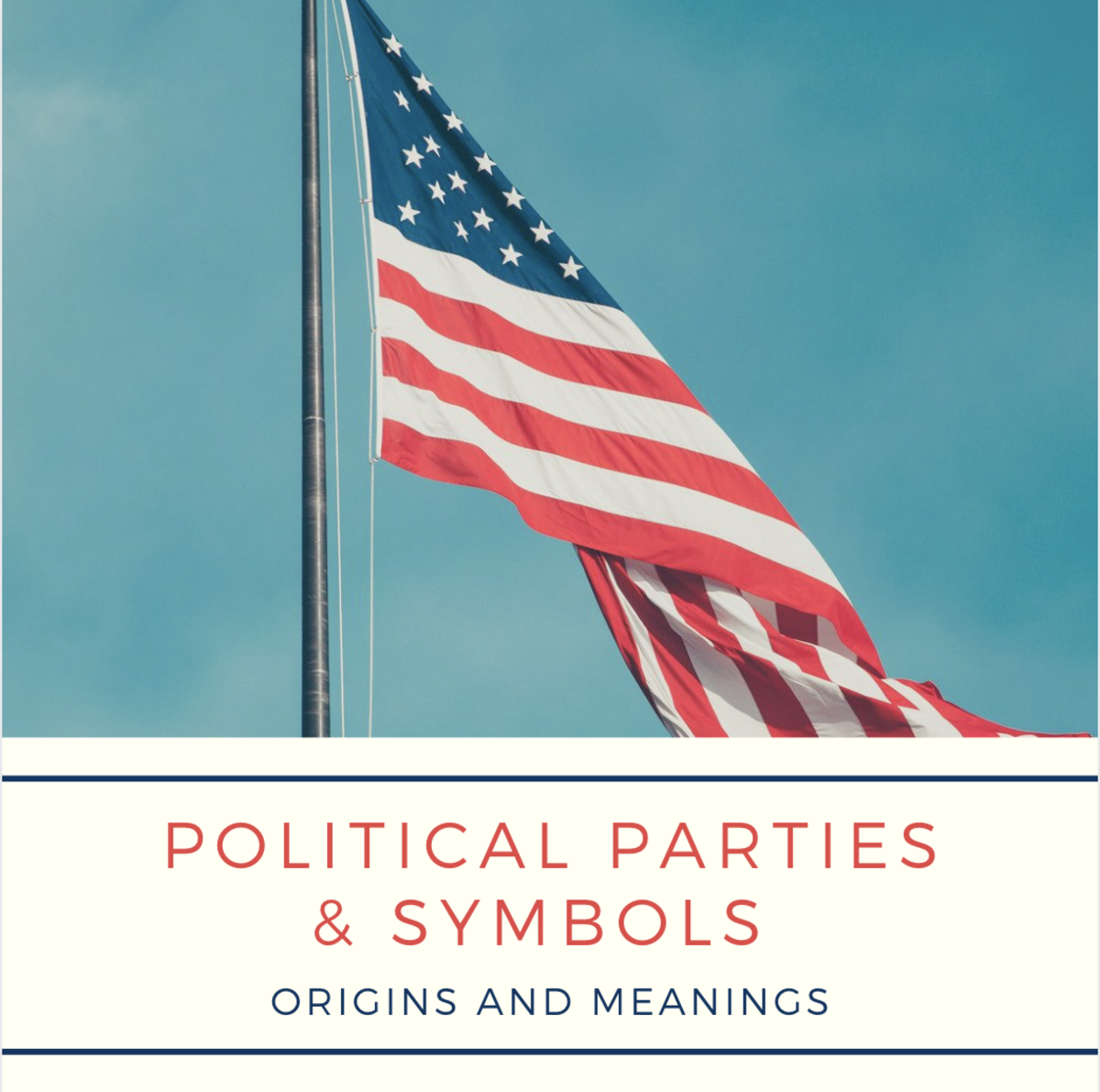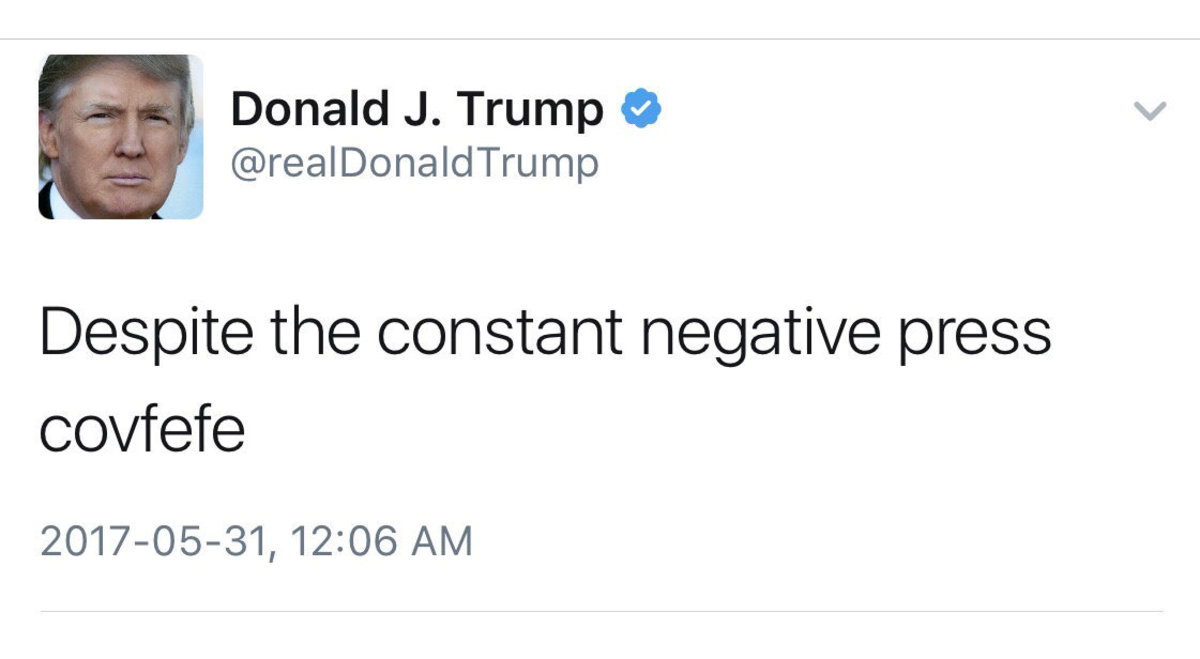On Principle and Pragmatism IIIc - Plato, Washington, Adams, Jefferson, and the U.S. Constitution [89]
Forward
THIS HUB BEGINS PART 3 which looks at the development of Plato's final decision that led him to drop his idea that the best government is one ruled by a wise Philosopher-King to one ruled by Law. If you want to read Part 1, click here. If you want to read Part 2, then click here.
Plato's Third Trip to Sicily
IT CAME TO PASS THAT PLATO RECEIVED a correspondence from his old pupil and friend Dion, who was still in exile. In it Dion requested that Plato return to Sicily for Dionysius II has had a change of heart and wanted Dion and Plato to come back. Dion, taking up that old Reagan adage, trust but verify, wanted Plato to go test the waters and see if Dionysius II was serious. Wisely, Plato demured. Not long after, however, Dionysius II sends a trireme for Plato, beseeching him to come and educate him as well as set up a school to spread his philosophy.
Against his better judgement Plato gives in and returns to Sicily. Reality was that Dionysius II had no interest to learning but instead wanted Plato to help him steal the rest of Dion's estate. The plan was for Plato to sign a document that purports to send half of Dion's estate to Dion, but under Plato's control while maintaining the other half for Dion's son. In addition, Dion would be allowed to return to Sicily whenever he wanted so long as 1) he promised not try to overthrow Dionysius II and 2) Plato would assure Dionysios II, on Dion's behalf, the same thing; and, oh by the way Plato, 3) I am not letting you leave Sicily for a year. Plato agrees to send a letter to Dion regarding these terms ... and to stay.
Once sent, Dionysius II ultimately seized Dion's estate for himself, but let it be known to those in Athens that this was Plato's idea. At the same time, Dionysius II in effect placed Plato under house arrest; the wisest man at that time had just been captured by Dionysius II ! This state of affairs lasted through the Winter; however, after much pressure from high placed Athenians, Dionysius II agreed to let Plato return home.
The Metamorphisis
ONE OF THE FALLOUTS FROM PLATO'S UNFORTUNATE "incarceration" in Sicily at the hands of Dionysius II was that he had ample opportunity to cast blame on Plato and away from himself. Many people, Atheneans included, came to believe that Plato was the one responsible for the fleecing of Dion and, in fact, was plotting his murder. Plato's reputation suffered quite a bit of damage and Epistle VII was Plato's defense of himself; his damage control as it were.
Plato's reputation wasn't the only thing that was damaged as a result of his third experience in Sicily, so was his philosophical conclusions as to what is needed for a Just society ... and a Philosopher-King was no longer the answer. Plato came to understand the saying that "power tends to corrupt and absolute power corrupts absolutely" meaning that no man, after assuming the mantle of King, could, in the long run, rule with reason and wisdom. There must be another solution!
In The Republic, Plato believed that wisdom and reason, in the right, virtuous person, would overcome one's tendency to become corrupt. After his last trip to Sicily, Plato now believed,
"HUBPAGES WILL NOT LET ME PUBLISH THIS QUOTE BECAUSE IT IS DUPLICATED AND AVAILABLE ELSEWHERE ON THE INTERNET (such as Wikipedia, where I got it from)" But it basically said that if a leader as absolute power then he will be corrupted ... I prefer Platos version from (Plato, Laws, Book 9)
Plato, now near the end of his life, developed a more pragmatic approach to a Just society, one based on the unbiased, impartial "Rule of Law" embodied in a written constitution rather than based on a corruptible monarch or a just as corruptible pure democracy. Further, Plato proposed that the government be run by representatives of the people with a suggestion on how they ought to be elected and that, to prevent corruption,there be a rotation of those representatives.
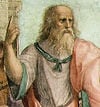
The Rest of the Story
IT IS IN HIGH SCHOOL* WHERE WE FIRST LEARN THAT AMERICA'S DEMOCRACY was based on Greek democracy. The problem is, it isn't. Instead, it is based on the ideas Plato first expressed in "The Laws" around 340 BC and not the democracy as practiced in Athens from around 600 BC. As an aside, Greece wasn't Greece as we know it today, instead it was made up of many independent city-states, each with its own constitution; Athens was one of the strongest, if not the strongest.
(* having watched my grandson matriculate from pre-K to 6th grade, I am beginning to understand learning has been pushed back several grades, so this knowledge may come much sooner.)
What separates Athenian democracy from American democracy is Athenian democracy was a direct democracy where all "citizens" participated in decision-making. Now "citizen" does not have quite the same meaning in ancient Greece as it does in modern, meaning post-civil rights America. Unfortunately, the further we go back in American history, our definition of citizen becomes closer to that of ancient Greece which is any land-owning male that belongs to a city-state's military; notice the absence of women and slaves from this definition.
Now when I say 'all' citizens, I do mean all, attendance at assemblies was mandatory. It is in these assemblies where issues were debated and voted on and all important decisions were made. This is called Direct Democracy.
Further, although there was no formal bureaucracy as we understand it today, it was expected that all citizens to be able to perform any governmental duty and that they must devote some of their time to performing these functions. Nor was the assembly the be-all, end-all, there was also a hierarchy. Above the assembly was the council of 500, who monitored the assembly and gave them topics to discuss, as well as bills to vote on. Next comes the Magistrates who acted as the “Police in the Government.” Their job is to ensure that all of the laws are being followed and act accordingly when they are not. After them comes the Council of the 10 Generals. The Council of 10 Generals, similar to the Generals of our military, was in charge of the military who were elected by the Magistrates.
Finally, Athens had a judicial system as well that was similar to ours. In the Athenian case, there were 6,000 people on the law courts at one time; however they did not have all 6,000 of them on the jury at one time. The jury usually consisted of 200-600 men per case.
In "The Laws", Plato turns things on their head and suggests that, while not ideal, the most effective Just government is one where the rulers are elected by the citizen; in other words, a Representative Democracy, similar to what we have today. But, before there is a government, there has to be a written constitution that must created for the Law can be the only real ruler of a State. He recommended a committee of the best and wisest in be called to write a constitution; a document that takes into account the corruptibility of rulers and officials.
The fundamental basis of the government is still the citizens, all men serving in the military, that is, and would still be called the assembly.
- Now, however, their primary responsibility is to elect the city's officers and magistrates and judging offenses against the public.
- Three hundred and sixty people would be elected to a council, through rather complicated procedure, ninety from each property class (again reversing himself, Plato moved away from his communistic common property belief to one in where citizens could own property) to represent that class.
- Both men, at least 30 years of age, and women, at least 40 years of age, could be elected to the council. With the inclusion of women, something America didn't do for a hundred or so years after its founding, Plato broke with long standing tradition of subjugating them.
- The council would be elected for a one year term and performed governmental administrative duties including the calling and dissolving the assembly, receiving foreign ambassadors, and supervision of elections.
Also to be elected were the 37 guardians of the Law, nomophulakes, must be at least 50 years of age and could serve until they were 70. These would, in essence, be the representatives as they were responsible for, among other things:
- Oversee the magistrates, bringing to the attention of others, those whom to seem to be getting out of line
- They had wide powers of supervising the citicizens in such ways as bring to heel those who spent too much, taking care of orphans, and granting permission to leave the country
- Excercising juducial authority in especially difficult civil or criminal cases,
- They had the power to revise and supplement existing Law.
Many of our Founding Fathers, especially the ones who stuck around to the end to craft and sign the U.S. Constitution or, through their writings, had great influence on its contents had read Plato. I think you can see the ideas of the House of Representatives, the Senate, and the Supreme Court may have begun here.
Plato and Aristotle
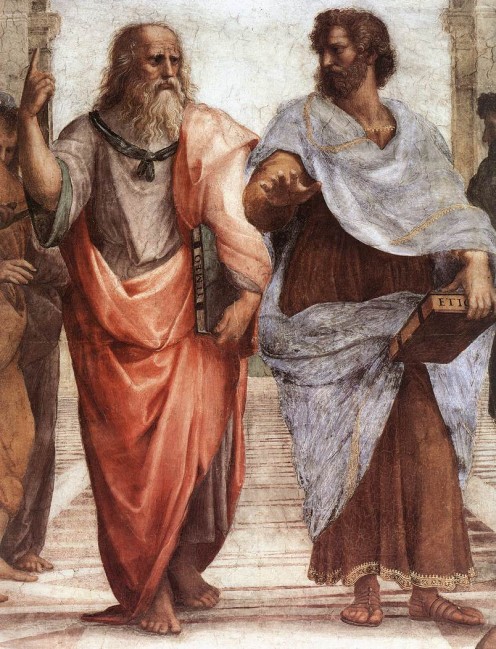
Plato's Other Contribution
THE IDEAS FOR the form of government wasn't Plato's only contribution. The Founding Fathers also took note and wrote about his views on what qualities the Citizenry must possess to make for a good government and a good society. Many of Plato's various expedients by which he sought to impart to it the quality of moderation (from Wikipedia) were:
- EDUCATION: The whole people were to be educated: they could not be all trained in
philosophy, but they were to acquire the simple elements of music,
arithmetic, geometry, astronomy - MILITARY SERVICE: They were also to be subject to military discipline, archonteskai archomenoi.
- Learning the true meaning of Justice. Socrates says justice is doing good to your enemies, anybody can harm your enemies, a really just person would return good for evil. Socrates foundation of truly good government is Justice.
- Rulers and citizens must possess these four cardinal virtues: Justice, dealing with other citizens, to do unto others as you would have them do to yourself; Courage, standing up for justice; Moderation, knowing an action must be tempered by responsibility, making the right choices in your life; Wisdom, takes all of the knowledge you have to live by these principals
- Understand that only the Law can be the real ruler of a nation.
The last of these, reinforced by the reasoning of Aristotle, is why we have the Constitution we have today.
Related Links
- On Principle and Pragmatism I - U.S. Constitutional ...
OpinionDuck, in one of his comments, invited me to his profile; i am glad I went and would encourage you to go as well. Since I don't have OpinionDuck's permission, I won't copy from the profile but the gist of the opening is that Our opinion is... - On Principle and Pragmatism II - U.S. Constitution R...
On September 17, 1787, the Constitution of the Unitied States was returned out of the Constitutional Convention to the Continental Congress who, in turn, debates on and then refers the Constitution to the various States for ratification. On June 21,. - On Principles and Pragmatism IIIa - Plato, Washingto...
The foundation for the U.S. Constitution stretch all the way back to 400 B.C. Our Founding Fathers read extensively of the works of Plato and Aristotle. These two great thinkers, among others, had great influence on what our government looks like tod - On Principle and Pragmatism IV - What do Plato, Aris...
AS WE all know, there just aren't Republicans and Democrats; instead, there is a whole panoply of variations that start in the middle and move continuously left and right. In current American politics, the limits of these variations, in practical...

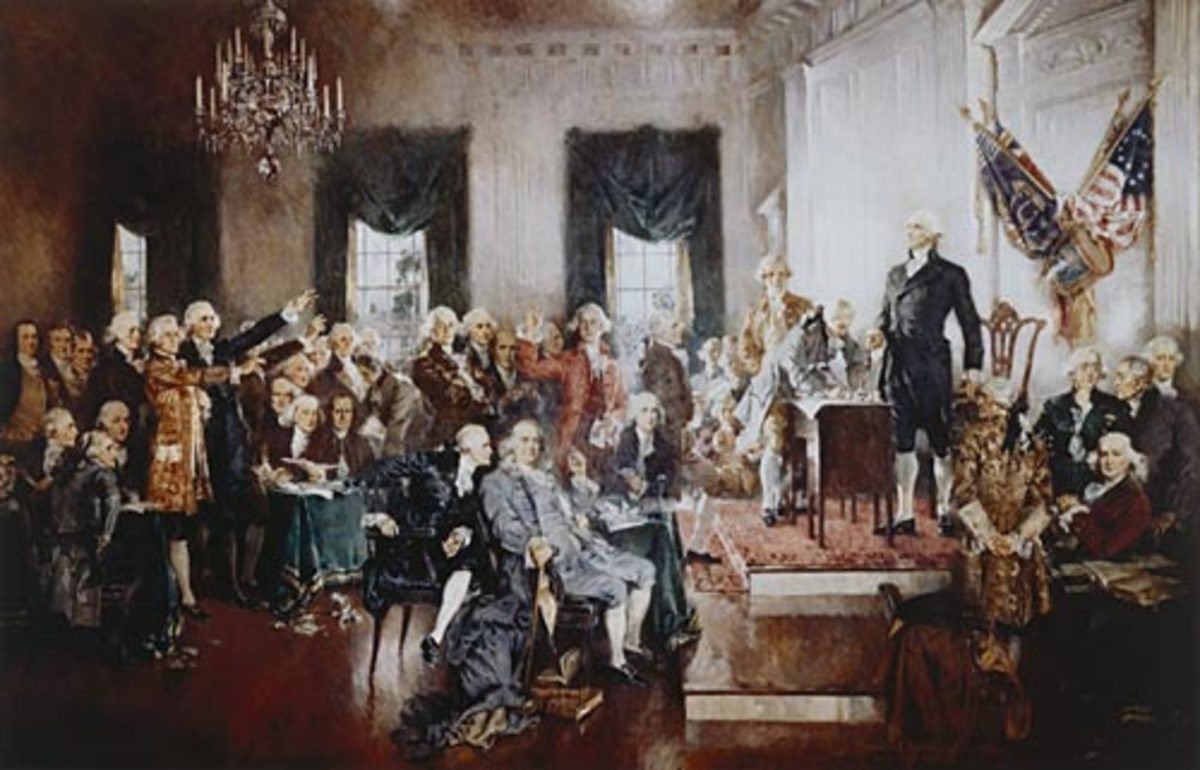
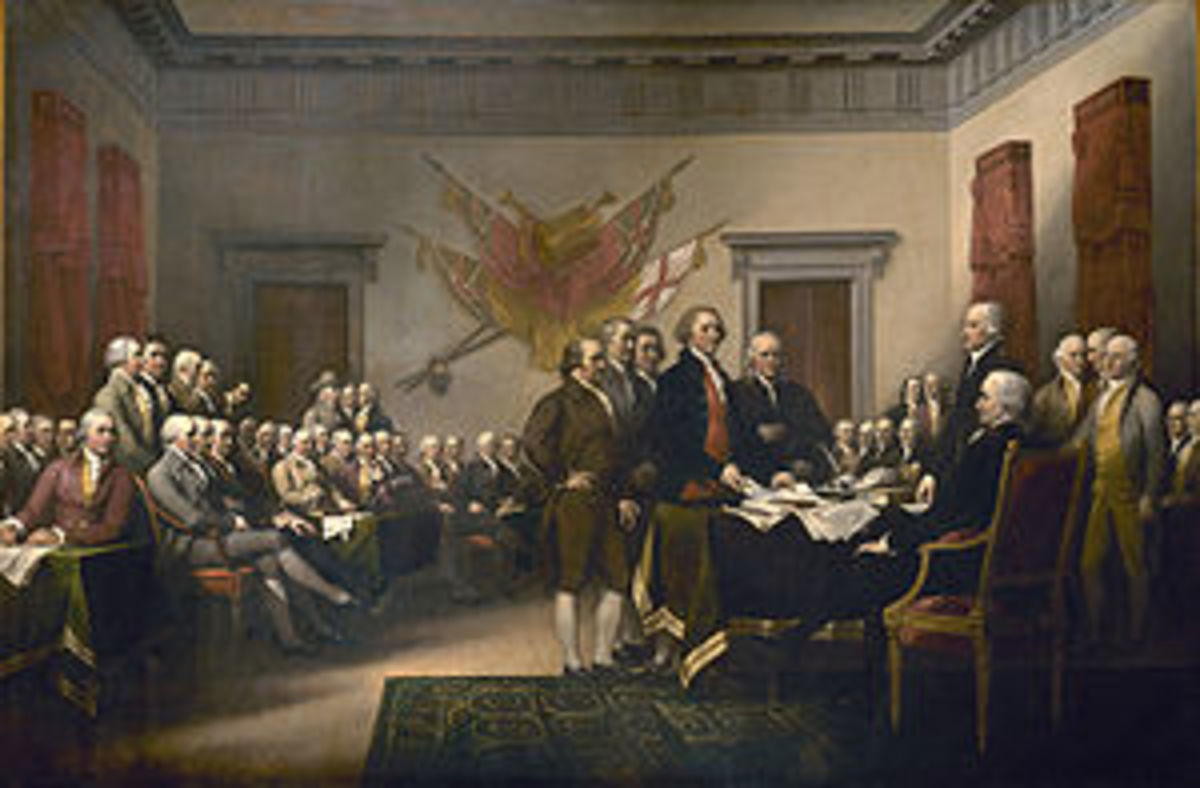

![On Principle and Pragmatism Ia - U.S. Constitutional Convention [9]](https://usercontent2.hubstatic.com/13151065_f120.jpg)
